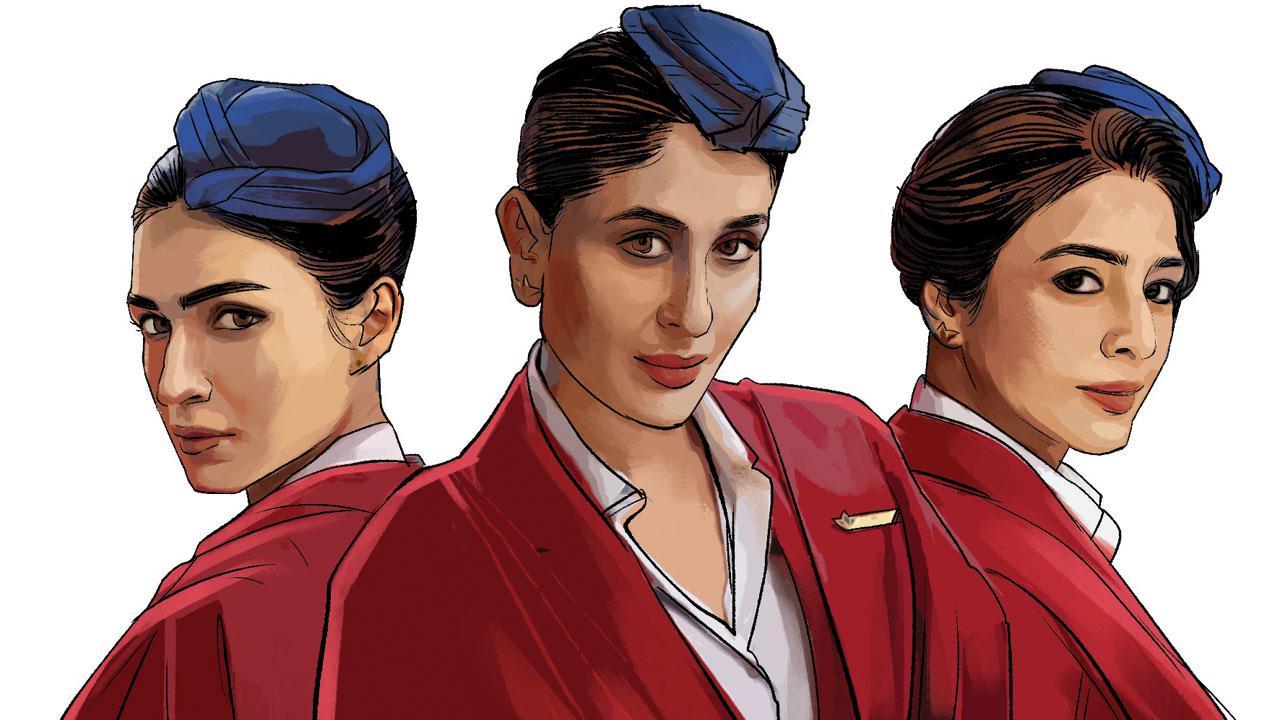Cut to 2024. The film’s flight attendant protagonists have not received their salaries for six months

Illustration/Uday Mohite
![]() Spoilers and puns ahead.
Spoilers and puns ahead.
ADVERTISEMENT
It is fitting that the two main songs of Crew are from the 1990s: Choli ke peeche kya hai and Ghagra, Ila Arun’s voice driving sex through a sludgy re-mix road, scattering gravel with each swerve of her “ghumiyo”. It was a decade in which girls really did have fun. And Crew’s story is birthed in Indian liberalization’s first decade, whose quintessential figure was the air hostess or flight attendant, working in all those new private airlines that promised to give the new economy, and the new woman, wings.
Cut to 2024. The film’s flight attendant protagonists have not received their salaries for six months. Missed EMIs haunt their nightmares. It’s the economy, stupid. Many men in the film are unemployed or unemployable. Women keep things going with what jobs they can get, side hustles, clawing their way to a PF. Kriti Sanon is trained as a pilot but works as a flight attendant. Liberalisation’s the boyfriend who texted and ghosted the Frankfinn girl.
The characters try a pre-liberalisation move: smuggling. They think they have things beat. Then they discover that the Subroto Sarkar-Vijay Mallaya mash-up Chairman of their airline, having made his millions off their labour, is now smuggling said millions as gold bricks, through them to declare bankruptcy, flee the country and leave thousands of employees stranded. Thus begins their sometimes funny, sometimes sloppy vigilante journey.
Tabu reclining in kaftans with a casual smoke, her voice dark and sweet like Vietnamese coffee. Kareena, amoral and desi and decadent like white butter gliding ever so slowly on a hot ajwain paratha. Kriti, like many Chandigarh girls I’ve known, driven and tense. The lived-in beauty and the umami worldliness of the older women, in fact a world of many women, Diljit Dosanjh yumminess and Kapil Sharma’s Bearhug Boyfriend vibe makes Crew often pleasurable.
But as with the economy, we are promised a flight of fancy and left halfway to paradise. Crew is often funny, but it has only three truly terrific lines: Kareena to a lover’s angry wife: I didn’t cheat on you na. Tabu to Kareena: Oh Cleopatra, foundation hai, time machine nahin. And Tabu asked to hurry: it’s a 100-dollar coffee. I’ll finish every pocket of foam. Crew also has one too many cringe-classist lines: “I’ve worked like a bai” “I’ll have to put my kid in a government school” “Should I work as a hooker?” —as if those women are not working women yaar. Come on.
Crew is an inadvertent allegory of the last three decades. A middle-class complicit in a capitalist dream. Temporary rewards, followed by unpaid EMIs. A new party voted into power—for development—but crony capitalists got rich and ditched the nation. The poor get screwed. The middle-classes teeter.
Crew works by reflecting these experiential truths and making women’s inner lives the centre. Crew is unable to break free of the world it critiques, offering neither political punch nor creative flight—gee, I wonder if the two are connected. Both things are constrained, like legroom on Indigo Airlines. Using middle-class discontent as meaningful heft shows a lack of political understanding. A careless script without any screwball absurdity feels like they know we, the audience, are hungry for fun films with women and would settle. Why should boys have all the capitalism, bas?
But, yeh dil maange more. Because we’re worth it. Or aren’t we?
Paromita Vohra is an award-winning Mumbai-based filmmaker, writer and curator working with fiction and non-fiction. Reach her at [email protected]
 Subscribe today by clicking the link and stay updated with the latest news!" Click here!
Subscribe today by clicking the link and stay updated with the latest news!" Click here!







